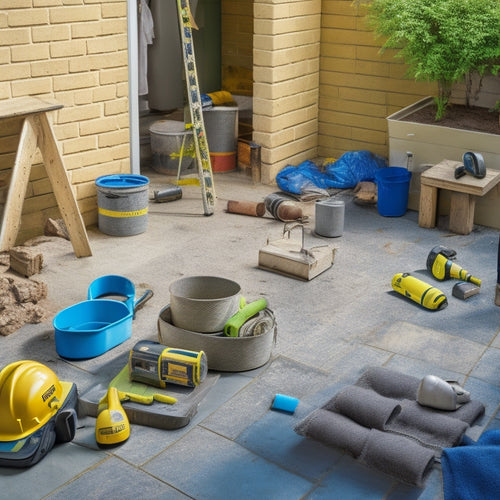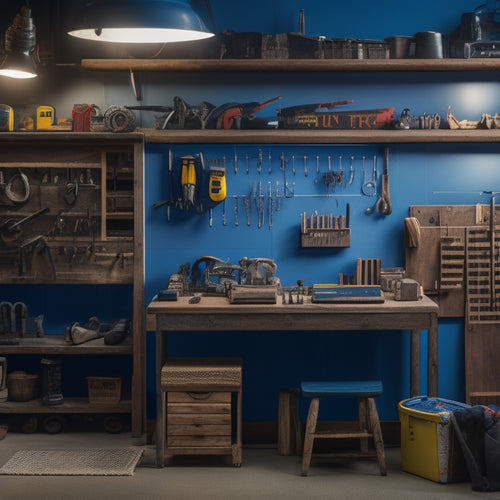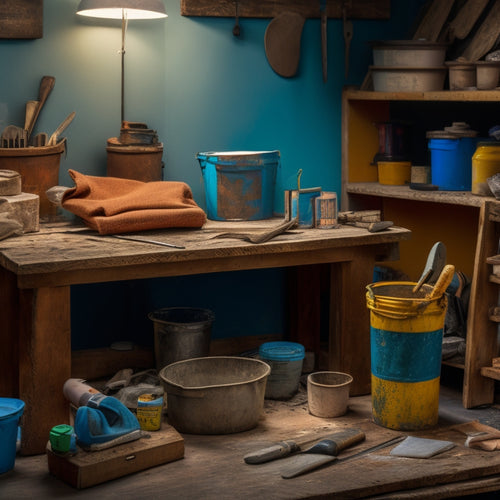
3 Best Tools for DIY Home Renovation Repair
Share
When tackling DIY home renovation repairs, you'll need a few essential tools to get the job done. For flooring repairs, a tape measure, hammer and chisel, and pry bar are must-haves. For concrete work, a concrete mixer, finishing trowels, and edgers are vital for achieving a smooth finish. Additionally, a level and putty knife will come in handy for ensuring even surfaces and applying adhesives. With these tools in your arsenal, you'll be well-equipped to tackle a variety of DIY renovation projects - and that's just the starting point for creating a beautifully restored space.
Key Takeaways
• A tape measure is essential for assessing damaged areas and determining the best repair technique for DIY home renovation projects.
• A hammer and chisel are necessary for removing damaged hardwood planks and making way for new flooring materials.
• A pry bar is a must-have for gently lifting flooring materials without causing further damage to the surrounding area.
• A level and putty knife are crucial for achieving even surfaces and applying adhesives correctly during DIY repairs.
• Regular tool maintenance, including cleaning and lubricating tools, is vital to ensure they remain in good condition for future projects.
Essential Tools for Flooring Repair
When tackling flooring repair, you'll need a set of reliable tools to guarantee a successful and stress-free renovation, starting with a trusty tape measure to accurately assess the damaged area. This will help you determine the extent of the damage and choose the right repair technique for your specific flooring type.
For instance, if you're dealing with hardwood floors, you'll need a hammer and chisel to remove damaged planks, while tile floors may require a tile scraper and adhesive remover.
Other essential tools include a pry bar for gently prying up flooring, a level to ascertain even surfaces, and a putty knife for applying adhesives and fillers. Depending on the type of flooring, you may also need specialized tools like a carpet stretcher or laminate floor cutter.
Having the right tools on hand won't only save you time and frustration but also guarantee a professional-looking finish. By investing in these must-haves, you'll be well-equipped to tackle various flooring repair techniques and achieve a beautiful, long-lasting result.
Tool Maintenance for Cement Floors
To guarantee your tools remain in top condition and continue to deliver precise results, you'll need to prioritize regular maintenance, particularly when working with cement floors that can be notoriously harsh on equipment.
Cement dust and residue can quickly build up on your tools, causing them to become clogged and inefficient.
Here are some essential maintenance tips to keep in mind:
-
Clean your tools immediately after use: Use a soft-bristled brush or a cloth to wipe away any cement residue or dust.
-
Lubricate moving parts: Apply a few drops of lubricant to hinges, gears, and other moving parts to keep them running smoothly.
-
Store tools in a dry, clean environment: Avoid storing tools in humid or damp areas, as this can cause rust and corrosion.
-
Regularly inspect and replace worn-out parts: Check your tools regularly for signs of wear and tear, and replace any parts that are no longer functioning properly.
-
Use a tool cleaning solution: Invest in a good-quality tool cleaning solution to help break down and remove stubborn cement residue.
Must-Have Equipment for Concrete
With your tools in top condition, you're now ready to tackle concrete projects, and that requires having the right equipment to get the job done efficiently and effectively.
When it comes to working with concrete, you'll need specialized gear to mix, pour, and finish the material. A concrete mixer is a must-have for any concrete project. This machine will save you time and energy by mixing the concrete to the perfect consistency.
You'll also need a range of finishing tools, such as finishing trowels, edgers, and floats, to achieve a smooth, even finish. Finishing trowels, in particular, are essential for spreading and smoothing out the concrete. Look for high-quality trowels with durable blades and comfortable handles.
Additionally, consider investing in a concrete screed or leveling tool to guarantee your concrete is perfectly level and even.
With these essential tools in your arsenal, you'll be well-equipped to take on any concrete project that comes your way.
Frequently Asked Questions
What Safety Gear Is Required for DIY Home Renovation Projects?
When tackling a DIY home renovation project, you're putting yourself at risk of injury if you don't wear the right safety gear.
You'll need safety goggles to protect your eyes from debris and dust, and work gloves to grip tools securely and prevent cuts. Don't even think about starting without them!
You'll also want a dust mask, a hard hat, and steel-toed boots to complete your safety arsenal.
Trust us, it's better to be safe than sorry.
Can I Use a Laser Level for Uneven Ceiling Measurements?
You might've heard that laser levels are only for precise, straight lines, but that's a myth.
In reality, a laser level can be a game-changer for uneven ceiling measurements.
Its benefits lie in its ability to project a level line or dot, allowing you to take accurate measurements.
By using techniques like rotating the laser to find the highest or lowest point, you'll get spot-on readings.
Trust us, a laser level will become your new best friend for tackling those tricky ceiling measurements.
How Do I Dispose of Old Flooring Materials Sustainably?
When getting rid of old flooring, you'll want to do it sustainably.
Start by checking local recycling options for materials like hardwood, tile, or carpet.
You can also consider flooring donation to organizations like Habitat for Humanity ReStores or local charities.
Make sure to properly clean and prepare the materials before dropping them off.
What's the Best Way to Organize My DIY Tool Collection?
You're drowning in a sea of screwdrivers and hammers, right? It's time to tame the chaos!
You need a system that'll keep your DIY tool collection organized and within reach. Start by categorizing your tools into groups, like 'electrical' or 'plumbing'.
Then, invest in tool storage solutions like pegboards, bins, and toolboxes.
Can I Rent Heavy Equipment for Single-Project Use?
When tackling a single project, you don't need to break the bank on heavy equipment.
Consider equipment rental options to save on costs. This way, you can allocate more funds to other aspects of your project budgeting.
Research local rental companies and compare prices to find the best deals. Be sure to factor in delivery and pickup fees, as well as any operator training or certification requirements.
Conclusion
You've finally finished that DIY home renovation repair, and your hard work has paid off.
But as you stand back to admire your handiwork, you're reminded that without the right tools, your project would have been a disaster.
A hammer is just a hammer, but a hammer in skilled hands is a game-changer.
By investing in the best tools for the job, you've not only saved time and money but also guaranteed a professional-grade finish that will last for years to come.
Related Posts
-

7 Patio Safety Tips for DIY Renovation Projects
As you begin your DIY patio renovation project, prioritize safety by evaluating the worksite for tripping hazards and...
-

7 Smart Tool Organization Tips for Small Renovations
As you tackle your small renovation, you're likely wasting precious time searching for misplaced tools. To enhance ef...
-

DIY Plastering Supply Checklist for Home Renovation
To tackle a DIY plastering project for your home renovation, you'll need a solid checklist of supplies. Start with es...


